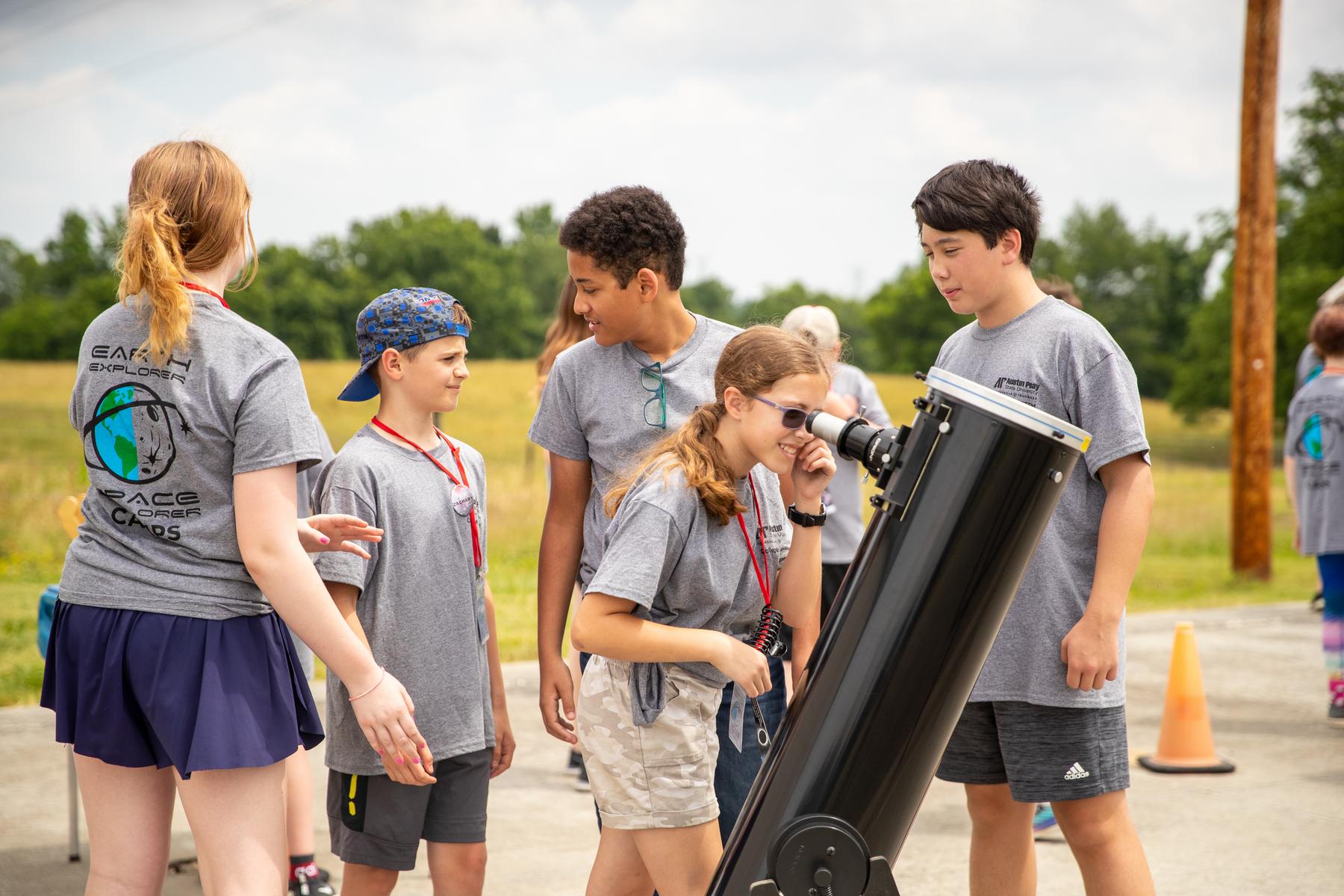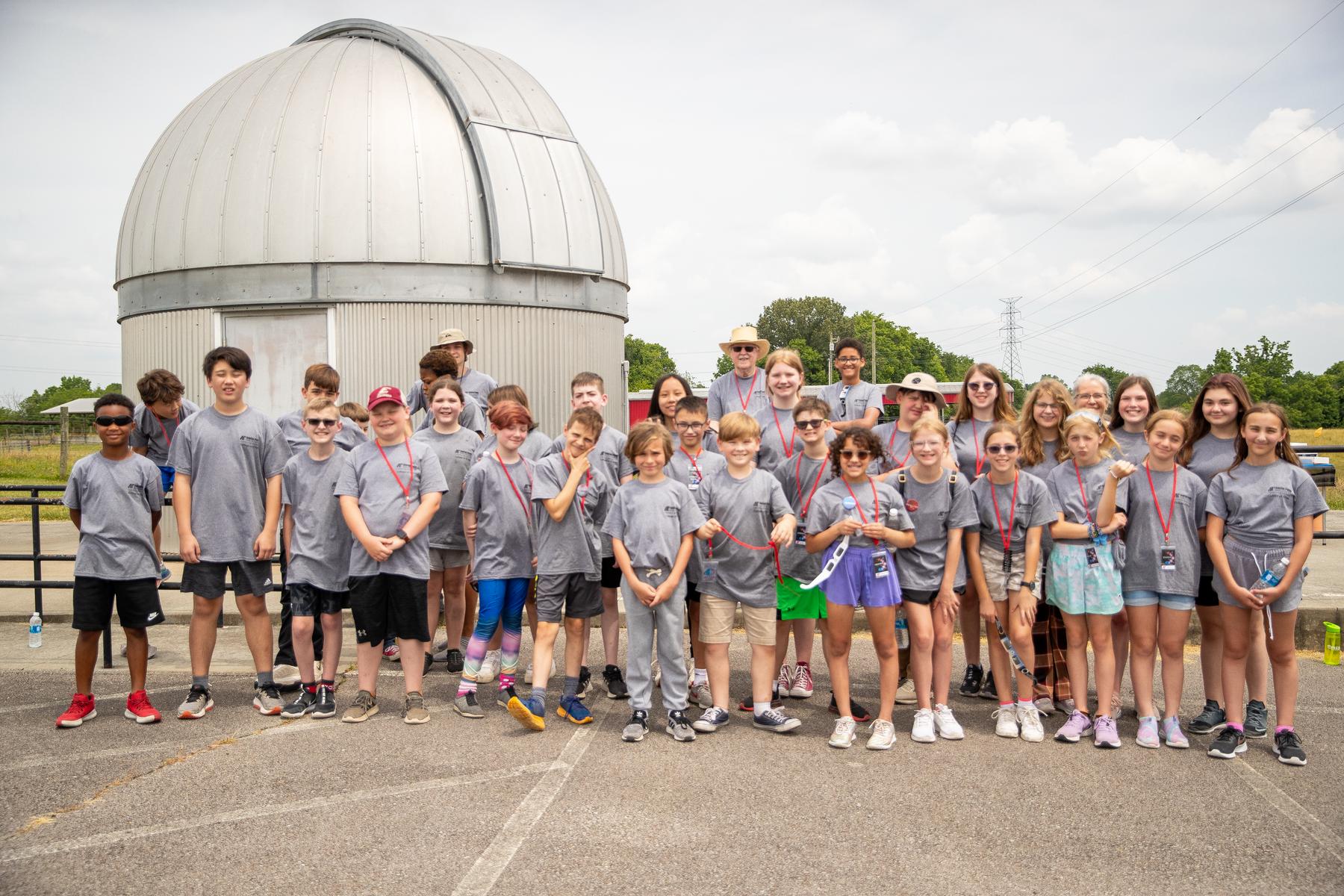Students embark on journey of discovery at APSU’s Space Explorers Camp
(Posted on Thursday, June 22, 2023)
CLARKSVILLE, Tenn. – Students at Austin Peay State University’s (APSU) Space Explorers Camp visited the Farm and Environmental Education Center on June 15 on a mission to examine the sun through telescopes at the observatory, but a blanket of clouds blocked the way.
Dr. Spencer Buckner, an associate professor in the Department of Physics, Engineering and Astronomy, told the students that the day would consist of “dodging clouds,” so even when their excitement faded, they waited patiently for the sun to come out of hiding. During the downtime, Buckner showed the students how to properly look through and delicately position the telescopes - then out of nowhere, a student yelled, “I see the sun! I see the sun!”
The students quickly reformed the assigned lines that had dissipated during the wait as their excitement skyrocketed. They were then able to look through the telescopes and observe the sun, and Buckner helped guide them as they gazed into the field of astronomy.
The Space Explorers Camp is the College of Science, Technology, Engineering & Mathematics’ latest science-themed summer camp and was hosted from June 12-16. It was designed to teach students ages 9-14 about space exploration and astronomy and provides foundational knowledge about planets, stars and the mysteries of space.
“I'm hoping they garner a little interest in science,” Buckner said. “I want them to be interested in astronomy. But if I can just get them to be interested in science in general [that’s important], because there are not enough people doing science. These are middle school kids. And what we have found in education is that young kids are curious and interested in sciences, but when they get to the middle and high school ranges, they start dropping away.”
Students spent their week learning about the mysteries of space and making use of new technologies. The camp also offered many different activities for the students to take part in.
“Well, overall, I think it's been great. It's a really cool camp.” London Ellis Smith, a 9-year-old student at Rossview Elementary, said. “We've drawn the orbital paths of every planet and we've got special glasses. We've got these special glasses to see the sun and the light paths.”
The students learned how craters are made and handled roughly a dozen meteorites from Buckner’s personal collection, including a large iron meteorite weighing over 12 pounds. They also built a 3D-printed version of the James Webb Telescope and learned more about NASA observatories.
Throughout the week, the students also spent plenty of time in the Robert F. Sears Jr. Planetarium learning about constellations, stars, galaxies, planets and Earth’s moon. Buckner said the planetarium visits were one of the campers’ favorite activities, and they were excited to share what they learned each day with their families.
“[I want to be able to] tell my parents important stuff that they never knew,” Travis Beasley, a fourth grader at Liberty Creek Elementary, said.
The campers closed out the week with a Friday night session at the observatory, and parents, siblings and friends were invited to join the fun.
“The night turned clear around sunset, and we got to see a number of astronomical objects in the night sky using several of the telescopes we keep at the observatory,” Buckner said. “While the kids were starting to get tired and several families left by 9 p.m., a few hung out until 10 p.m. to see even more.”
Buckner said the College of STEM plans to bring back Space Explorers Camp next summer with additional activities like a water bottle rocket launch, and he hopes to see the students continue to develop a passion for astronomy.
“That’s what I want them to do,” he said. “We have a lot of activities that we do each day. And I'm hoping when they get home, they want to tell their parents all about what they did. I really want them to be excited about it.”
To learn more about APSU’s summer STEM camps, visit https://www.apsu.edu/costem/summer-camps.php.

